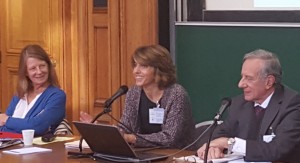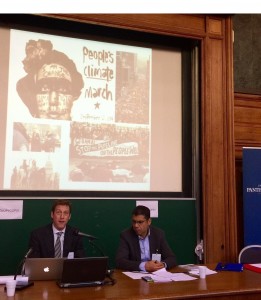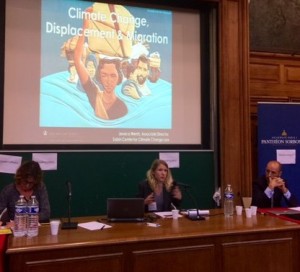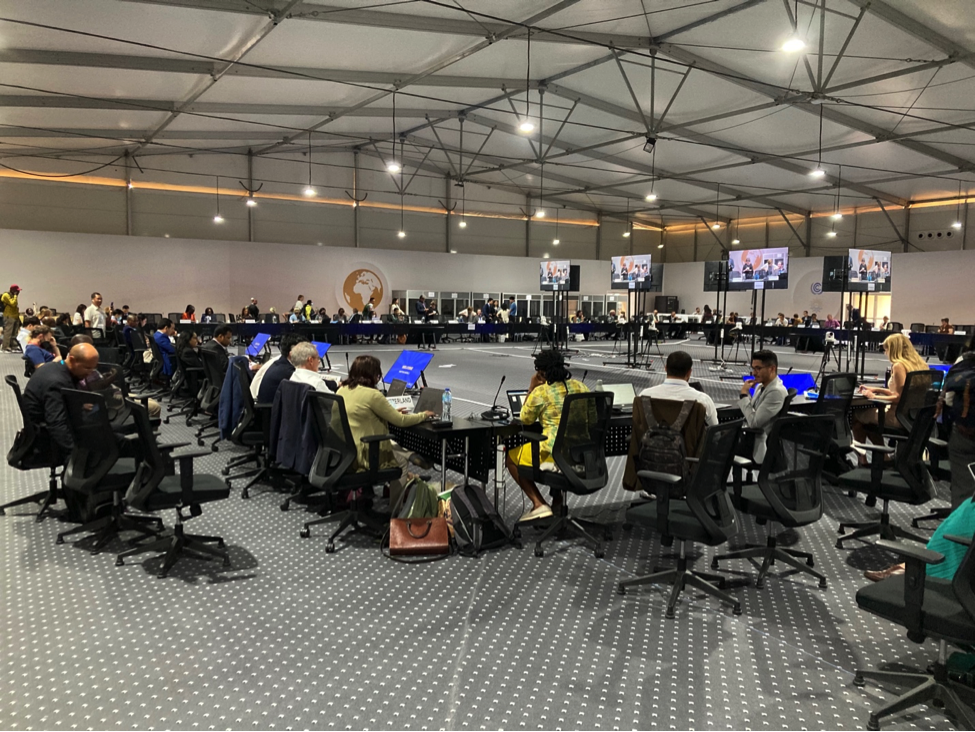Last week, the University of Paris 1 Panthéon-Sorbonne hosted an official COP21 side event: Social Dynamics and Climate Change. The conference was commissioned by the French government to provide an interdisciplinary perspective on the social and institutional changes that will be needed to mitigate and adapt to global climate change. Several representatives from the Sabin Center attended the program as part of our Alliance Program—a joint venture between Columbia University and three prestigious French institutions (Panthéon-Sorbonne, Sciences Po, and the École Polytechnique).
The conference brought together experts from a diversity of disciplines to examine both the transformative effect of climate change on societies and the innovative measures that will be needed to de-carbonize our economies and prepare for the impacts of climate change. Specialists in law, economics, geography, philosophy, art, and other subjects provided complementary perspectives on topics such as energy governance, urban regeneration, green growth, adaptation and vulnerability, climate justice, and the political economy of climate change. Keynote speakers included Klaus Töpfer, former Executive Director of UNEP and former German Federal Minister for the Environment, and Carlo Carraro, Vice-Chair of the WGIII of the IPCC and Chancellor of the University of Venice.
 One of the key themes that emerged from this discussion was that we cannot rely on the private sector to deliver an adequate response to climate change—robust laws and policies must underpin the transition to a sustainable and carbon-neutral future. For example, in a panel on energy transitions, the speakers uniformly recognized that government intervention (e.g., subsidies, publicly-funded research, and regulation) is necessary for the de-carbonization of the energy sector. Teresa Parejo-Navajas, a former visiting scholar at the Sabin Center, spoke on the panel, describing various legal approaches to promoting energy efficiency in existing buildings, comparing the most important measures developed in both the EU and in the US. Her paper on the subject is available here.
One of the key themes that emerged from this discussion was that we cannot rely on the private sector to deliver an adequate response to climate change—robust laws and policies must underpin the transition to a sustainable and carbon-neutral future. For example, in a panel on energy transitions, the speakers uniformly recognized that government intervention (e.g., subsidies, publicly-funded research, and regulation) is necessary for the de-carbonization of the energy sector. Teresa Parejo-Navajas, a former visiting scholar at the Sabin Center, spoke on the panel, describing various legal approaches to promoting energy efficiency in existing buildings, comparing the most important measures developed in both the EU and in the US. Her paper on the subject is available here.
Many speakers also highlighted the nexus between climate change and social justice, and the importance of accounting for the disparate impacts of climate change on those who are least responsible for and most vulnerable to these impacts. Michael Burger, Executive Director, spoke on a panel that was dedicated to the topic of “climate justice” and the role of courts in the pursuit of such justice. He discussed some of the litigation tactics that have been used to advance climate justice in the U.S., and in particular, recent attempts to use the public trust doctrine to compel government action on climate change. Summaries of these cases are available on our U.S. climate change litigation chart.
The issue of change-induced displacement and migration was another topic that received attention at the conference. A panel was convened to discuss empirical research on how climate change may affect patterns of displacement and migration, as well as possible responses from the international community. Jessica Wentz, Associate Director, discussed recent proposals for the creation of a Climate Change Displacement Coordination Facility within the UNFCCC  and the potential functions that this facility could fulfill. A paper on this subject is available here.
and the potential functions that this facility could fulfill. A paper on this subject is available here.
Several speakers provided a broader perspective on the potential outcomes for COP21. Scott Barrett, a professor at Columbia’s School of International Public Affairs, expressed skepticism about the efficacy of the current approach of “volunteerism” within the UNFCCC (wherein the Parties make national commitments for GHG reductions that are then monitored by the Secretariat). He suggested that governments should focus less on cooperation and more on coordination with respect to technological solutions, such as the development of carbon air capture technologies.
Carlo Carraro, Vice-Chair of the WGIII of the IPCC, had a more optimistic perspective on COP21. He illustrated how the intended nationally determined contributions (INDCs) from key players such as the U.S. and the European Union were close (although not perfectly aligned) with what is needed to keep warming within 2°C. He recognized that greater ambition will be needed in the coming decades, and noted that it will be “crucial” to have a global price signal to control carbon emissions in the long term. However, he seemed to think that the Paris Agreement will be a step in the right direction, and that the system of voluntary pledges and centralized monitoring will indeed help to ratchet up mitigation ambition in the coming decades.
Overall, many participants shared Carraro’s cautious optimism about the outcome of COP21 and the commitment of national governments to implement their GHG reduction pledges. Several speakers also highlighted recent court decisions holding governments accountable for climate change—including recent verdicts from the Netherlands and Pakistan—as promising developments in this area. Of course, the participants also agreed that although we are making important progress, there is much more that needs to be done. The UNFCCC’s synthesis report on the aggregate effect of INDCs reached the same conclusion.
There was less optimism about the issue of equity and climate change, and whether effective frameworks will be developed to address the disproportionate impacts of climate change on developing countries and poor people. Indeed, the question of compensation for climate harms (sometimes referred to as “loss and damage”) has been a topic of considerable controversy within the UNFCCC, and it is unlikely that the Paris Agreement will contain any substantive provisions on this subject. It seems that this is one area where much greater ambition will be needed in the near future.
Some participants suggested that international environmental law should be strengthened to empower citizens and give effect to environmental rights. For example, the Environmental Commission of the Club des Juristes (Lawyers’ Club), a French think tank created in 2007 to discuss innovative legal solutions for complex social problems, proposed the creation of a Global Environmental Charter as a new treaty that would give legal force to the environmental principles enshrined in documents such as the Rio Declaration and allow citizens to enforce these principles in court. The Club was represented by Yann Aguila, a French Attorney, and Yann Kerbrat, a Law Professor at Sorbonne 1. The proposal was also endorsed by Corinne Lepage, former French Minister of Environment.
In sum, the conference held at the University of Paris 1 Panthéon-Sorbonne provided an excellent overview of the social dynamics of climate change, with the presenters demonstrating a considerable degree of hope and optimism for the future to come.




